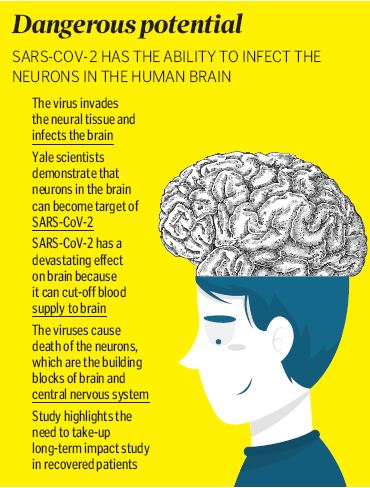
[ad_1]
Yale study demonstrates how it has the ability to invade and live in the neural tissue, infecting the human brain
Hyderabad: Covid-19 is generally considered as a disease of the upper respiratory tract where the lungs of the patients get affected, ultimately proving to be fatal. A new study of Covid-19 patients by researchers from Yale University School of Medicine, however, has demonstrated that the SARS-CoV-2 virus has the ability to invade and live in the neural tissue, thus infecting the human brain, which is also known as neurotropism.
The Yale researchers study titled ‘Neuroinvasion of SARS-CoV-2 in Human and Mouse Brain’ published on September 8 in the open access pre-print journal bioRxiv, is yet another instance of how devious the SARS-CoV-2 virus could be in systematically targeting organs of the human body. The study also offers a potential for physicians to understand the long-term toll of SARS-CoV-2 virus on the human body and its implications on the public health systems.
Several other studies in the past have also indicated that SARS-CoV-2 causes neurological symptoms like headache, dizziness, decreased alertness, difficulty in focussing, smell and taste disorders, seizures, strokes, weakness and muscle pain.
The Yale researchers study is receiving a lot of attention and is being hailed as compelling because they have demonstrated SARS-CoV-2 brain infection in three different models including mice, brain autopsy of dead Covid-19 patients and human brain orgonoids, which are artificially grown masses of cells that resemble human organs.
“We used three independent approaches to probe the capacity of SARS-CoV-2 to infect the brain. First, using human brain organoids, we observed clear evidence of infection with accompanying metabolic changes in the infected and neighbouring neurons,” the researchers said.

In the second approach, the Yale researchers used mice to demonstrate brain infection. “Using mice, we demonstrate in vivo that SARS-CoV-2 neuroinvasion, but not respiratory infection, is associated with mortality”.
In the third approach, through brain autopsy of dead Covid-19 patients, the researchers detected SARS-CoV-2 in the brain neurons of dead Covid-19 patients. “Our study provides clear demonstration that neurons can become a target of SARS-CoV-2 infection, with devastating consequences of localised ischemia in the brain and cell death, highlighting that SARS-CoV-2 neurotropism and guiding rational approaches to treatment of patients with neuronal disorders,” the Yale researchers said.
Professor in the Department of Cellular and Development Biology, Yale University, Akiko Iwasaki, who is also part of the study, said that many viruses have a history of infecting neurons in the brain. “Many viruses infect neurons such as Zika, Herpesviruses, West Nile etc. We show that SARS-CoV-2 can infect neurons also, but we do not know how frequent this is. Virus can get access to neurons through a variety of ways,” she said. The top researcher on viruses said that there was a need to study more autopsies to see how frequently neurons are infected in patients and its clinical consequences.
Now you can get handpicked stories from Telangana Today on Telegram everyday. Click the link to subscribe.
Click to follow Telangana Today Facebook page and Twitter .
[ad_2]
Source link